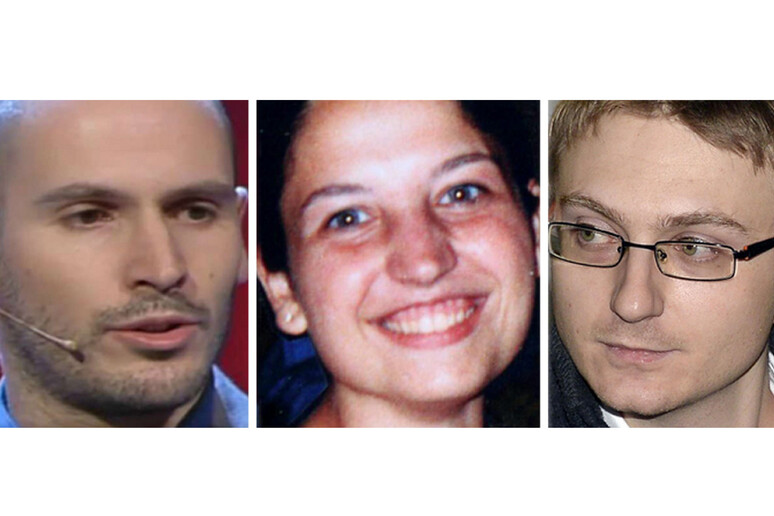Alberto Stasi, the 41-year-old
serving a 16-year jail term for brutally murdering his
girlfriend Chiara Poggi in 2007, has confidence that justice
will be served and the truth will come out, one of his attorneys
said on Wednesday after prosecutors in Pavia opened a new probe,
placing a friend of the victim's brother under investigation for
the murder.
Stasi has "confidence that full light will be shed" on the case,
said the lawyer Giada Bocellari.
"Alberto is very rational, he has at this point served nearly
all his sentence but he wants justice because he has always said
he was not responsible", explained his attorney.
The lawyer also said that Stasi's legal team would not file a
motion for a retrial until the new investigation into traces of
DNA found under the victim's nails allegedly belonging to her
brother's friend, 37-year-old Andrea Sempio, is completed.
The new probe kicked off after new forensic tests carried out at
the initiative of Stasi's legal team found that the DNA isolated
under the victim's nails, which had originally been deemed as
unserviceable by magistrates in Pavia who had investigated
Sempio in 2016, could allegedly match with the 37-year-old's
DNA. Meanwhile the attorney representing Chiara Poggi's family,
Gian Luigi Tizzoni, told ANSA that the ongoing investigation is
"the seventh attempt to revise a final conviction", something he
described as "rare, extraordinary".
"After the final conviction, a total of 40 magistrates have
dealt with the case and they all believed in Stasi's
responsibility", added Tizzoni.
In a years-long legal saga that led to Stasi's final conviction,
the former Bocconi business school student was twice acquitted
of the murder before the supreme Cassation Court in 2013
overturned those rulings and ordered a repeat of the
appeals-level trial.
In December 2014, Milan's appeals court convicted Stasi in a
sentence that was upheld by the Cassation a year later after the
student's family appealed twice.
In 2017 and 202, the supreme court rejected other appeals
presented by Stasi's legal team against his conviction.
According to the judges who convicted him, Stasi took advantage
of Poggi's trust to effortlessly murder her in cold blood.
"Poggi was totally defenceless," the explanation read.
The judges said the student, who was 24 at the time, murdered
his girlfriend because he had come to see her presence in his
life as uncomfortable and dangerous
The Milan court also ordered Stasi to pay one million euros in
damages to Poggi's family, 350,000 euros to each of her parents
and 300,000 to her brother Marco.
The verdict was hotly awaited in the so-called Garlasco case,
referring to the northern town where the 26-year-old was killed,
a high-profile murder that gripped the Italian public at the
time. Stasi claimed he found Poggi's lifeless body at her family
home on August 13, 2007, the day after the couple had had dinner
there together.
Her family were away on holiday.
He said that after dinner, he left his fiancée at her parents'
home and went to sleep at his own house.
He said he returned the next day because Poggi wasn't answering
her phone, only to find the front door open and her lifeless
body lying in a pool of blood.
Prosecutors said forensic tests carried out on his computer
found that he had not been working on his thesis the whole time
during the morning Poggi was murdered, as he had claimed, and
that crime-scene evidence contradicted this testimony.
Had he indeed walked on the villa's steps as he said, his shoes
would have been covered in blood, prosecutors said.
Meanwhile judicial sources on Wednesday said the new probe
carried out by Carabinieri police in Milan is looking into
evidence that was unduly disregarded by previous investigations,
including three phone calls made by Sempio's cell phone in the
days leading up to the murder, on August 4, 7 and 8, which were
very short and lasted respectively 10, 2 and 21 seconds - a
circustance deemed suspicious by investigators.
Sempio allegedly called the Poggi home even though he knew that
his friend, Chiara Poggi's brother Marco, and their parents were
away on holiday.
In addition, Sempio showed a parking ticket from the nearby town
of Vigevano to investigators to prove he had an alibi at the
time of the murder which raised the police's suspicion because
he had kept it for a year.
Cell phone data also allegedly showed he was in Garlasco when
Poggi was killed, according to investigative sources.
Prosecutors in Pavia will also need to analyse whether
footprints found at the crime scene are compatible with Andrea
Sempio's shoe size, judicial sources said Wednesday.
They will also compare the finger prints found at the Poggi
home, in particular on the soap in the villa's bathroom where
the killer is presumed to have washed their hands, according to
an order issued by the Cassation Court that has given its green
light to the new investigation.
And the geneticists who carried out the new forensic tests
ordered by Stasi's defence team, Lutz Roewer and Ugo Ricci,
which gave new impulse to the investigation, stated that the
genetic material found under Chiara Poggi's nails belonged to a
male and was "highly readable", according to defence sources.
A subsequent forensic test ordered by the State Attorney's
Officve in Pavia that reopened the case showed that Andrea
Sempio's DNA was compatible with the genetic material found on
the nails, according to the Cassation's ruling greenlighting the
new investigation.
ALL RIGHTS RESERVED © Copyright ANSA











